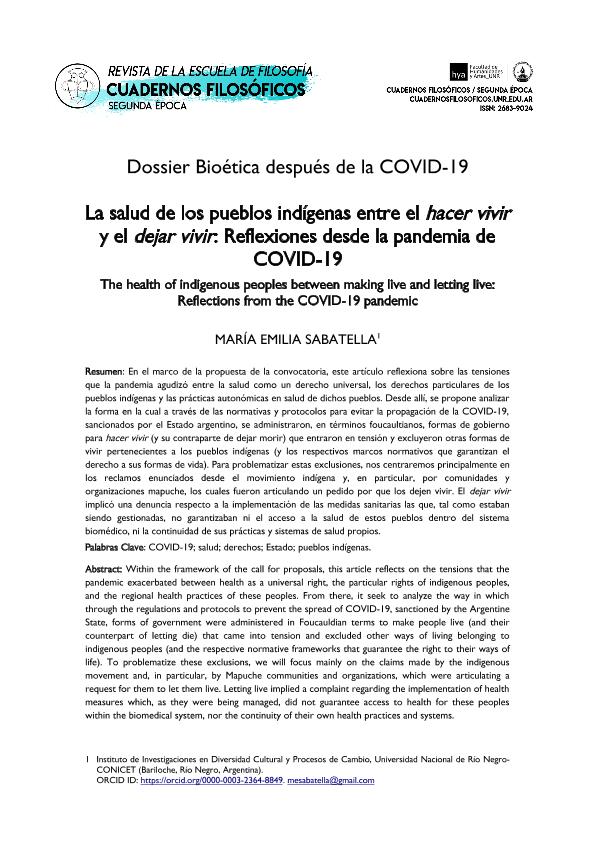Mostrar el registro sencillo del ítem
dc.contributor.author
Sabatella, María Emilia

dc.date.available
2022-07-26T11:31:49Z
dc.date.issued
2021-06
dc.identifier.citation
Sabatella, María Emilia; La salud de los pueblos indígenas entre el hacer vivir y el dejar vivir Reflexiones desde la pandemia de COVID-19; Universidad Nacional de Rosario. Facultad de Humanidades y Artes; Cuadernos Filosóficos. Segunda Epoca; 18; 6-2021; 1-26
dc.identifier.issn
2683-9024
dc.identifier.uri
http://hdl.handle.net/11336/163110
dc.description.abstract
En el marco de la propuesta de la convocatoria, este artículo reflexiona sobre las tensiones que la pandemia agudizó entre la salud como un derecho universal, los derechos particulares de los pueblos indígenas y las prácticas autonómicas en salud de dichos pueblos. Desde allí, se propone analizar la forma en la cual a través de las normativas y protocolos para evitar la propagación de la COVID-19, sancionados por el Estado argentino, se administraron, en términos foucaultianos, formas de gobierno para hacer vivir (y su contraparte de dejar morir) que entraron en tensión y excluyeron otras formas de vivir pertenecientes a los pueblos indígenas (y los respectivos marcos normativos que garantizan el derecho a sus formas de vida). Para problematizar estas exclusiones, nos centraremos principalmente en los reclamos enunciados desde el movimiento indígena y, en particular, por comunidades y organizaciones mapuche, los cuales fueron articulando un pedido por que los dejen vivir. El dejar vivir implicó una denuncia respecto a la implementación de las medidas sanitarias las que, tal como estaban siendo gestionadas, no garantizaban ni el acceso a la salud de estos pueblos dentro del sistema biomédico, ni la continuidad de sus prácticas y sistemas de salud propios.
dc.description.abstract
Within the framework of the call for proposals, this article reflects on the tensions that the pandemic exacerbated between health as a universal right, the particular rights of indigenous peoples, and the regional health practices of these peoples. From there, it seek to analyze the way in which through the regulations and protocols to prevent the spread of COVID-19, sanctioned by the Argentine State, forms of government were administered in Foucauldian terms to make people live (and their counterpart of letting die) that came into tension and excluded other ways of living belonging to indigenous peoples (and the respective normative frameworks that guarantee the right to their ways of life). To problematize these exclusions, we will focus mainly on the claims made by the indigenous movement and, in particular, by Mapuche communities and organizations, which were articulating a request for them to let them live. Letting live implied a complaint regarding the implementation of health measures which, as they were being managed, did not guarantee access to health for these peoples within the biomedical system, nor the continuity of their own health practices and systems.
dc.format
application/pdf
dc.language.iso
spa
dc.publisher
Universidad Nacional de Rosario. Facultad de Humanidades y Artes
dc.rights
info:eu-repo/semantics/openAccess
dc.rights.uri
https://creativecommons.org/licenses/by-nc/2.5/ar/
dc.subject
Salud
dc.subject
Pueblos Indígenas
dc.subject
COVID-19
dc.subject
Derechos
dc.subject.classification
Antropología, Etnología

dc.subject.classification
Sociología

dc.subject.classification
CIENCIAS SOCIALES

dc.title
La salud de los pueblos indígenas entre el hacer vivir y el dejar vivir Reflexiones desde la pandemia de COVID-19
dc.title
The health of indigenous peoples between making live and letting live: Reflections from the COVID-19 pandemic
dc.type
info:eu-repo/semantics/article
dc.type
info:ar-repo/semantics/artículo
dc.type
info:eu-repo/semantics/publishedVersion
dc.date.updated
2022-07-21T15:58:04Z
dc.journal.volume
18
dc.journal.pagination
1-26
dc.journal.pais
Argentina

dc.journal.ciudad
Rosario
dc.description.fil
Fil: Sabatella, María Emilia. Consejo Nacional de Investigaciones Científicas y Técnicas. Centro Científico Tecnológico Conicet - Patagonia Norte. Instituto de Investigaciones en Diversidad Cultural y Procesos de Cambio. Universidad Nacional de Río Negro. Instituto de Investigaciones en Diversidad Cultural y Procesos de Cambio; Argentina
dc.journal.title
Cuadernos Filosóficos. Segunda Epoca
dc.relation.alternativeid
info:eu-repo/semantics/altIdentifier/url/https://cuadernosfilosoficos.unr.edu.ar/index.php/cf/article/view/133
dc.relation.alternativeid
info:eu-repo/semantics/altIdentifier/doi/http://dx.doi.org/10.35305/cf2.vi18.133
Archivos asociados
